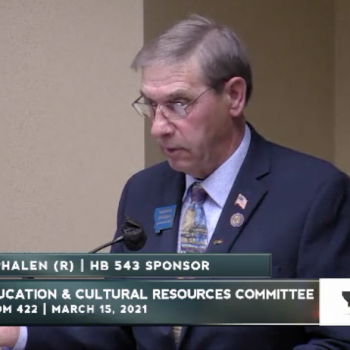What would it take for a shepherd to abandon his sheep?
Some American evangelical pastors are learning the answer to that question in real time as they watch members of their flocks fall headlong into conspiracy-theory thinking that leads to fractured relationships, COVID denialism, and even political violence.

Startling statistics from Lifeway Research (an arm of the Southern Baptist Convention), released as recently as January 2021, paint an alarming picture of Q conspiracies rapidly invading church life. They’ve found that roughly half of U.S. Protestant pastors “frequently” heard their flock repeating conspiracy theories. White pastors were the ones most likely affected; just over one-third of African American pastors report having heard those ideas spread within their congregations.
It’s also true that younger pastors are more likely to notice QAnon talk than elder ones, which might be a function of the way the information is spread: Pastors who are more plugged in to the internet zeitgeist might pick up on cues missed by their less computer-savvy counterparts.
We’ve all heard stories about pastors proclaiming the Word of Q or refusing to mask up against COVID. But there are other cases, too, in which social media and fringe news sources draw a congregation so deeply into the conspiracy theories, their pastors decide to walk away.
It’s not a decision these leaders are taking lightly, but the stakes are high — in some cases, literally life and death.
Christian Reformed Church pastor Vern Swieringa, for instance, told Business Insider‘s Sophia Ankel that, in his case, it was COVID denial that pushed him out the door. Because of his wife’s at-risk condition, Swieringa took the pandemic very seriously, and that caused some clashes with his congregation:
I put my foot down and said, ‘I’m not going to preach in front of a congregation that wants to sing and not wear masks.’ But they still wanted me to preach in front of them without wearing a mask… We agreed to separate at that point, and so it felt pretty cordial at the time. But I found out later that there were really hard feelings amongst the congregation, and many of them felt like I abandoned them. It was heartbreaking.
The emotional toll is significant, adds former Southern Baptist pastor Jared Stacey, also interviewed in Ankel’s article:
I do think that a lot of pastors are burdened right now and need a friend. It’s not easy watching people that you’ve invested time in become radicalized so quickly right in front of you.
Stacey’s case is particularly interesting because, while he remains a student of theology, Ankel reports that he decided to leave the Southern Baptists altogether.
We’ve already seen some pastors expressing concern about losing church members to conspiracy theories being spread online; this is an opposite but connected phenomenon, where church members have gone so deeply down the conspiracy theory rabbit hole that even their leaders have given them up for lost.
It’s a serious problem for the evangelical ecosystem.
But any time a massive number of people uncritically accept outlandish, unfalsifiable ideas about a powerful conspiracy, it’s a problem for the rest of us as well.
(Image via Shutterstock)




It’s Moving Day for the Friendly ..."
It’s Moving Day for the Friendly ..."
It’s Moving Day for the Friendly ..."
It’s Moving Day for the Friendly ..."